DNA fracturing leads to accumulation of mutations in cells and is one of the causes of cancer. DNA restoration or repair, in scientific terminology, can prevent mutations and cancer development, but can also restore the viability of tumor cells damaged by chemotherapy and radiotherapy. A team of scientists led by Anton Buzdin, head of the Laboratory of Translational Genomic Bioinformatics at MIPT, has studied the characteristics of DNA repair in cancer and normal cells. The results of the study are published in the new journal Heliyon of the prestigious scientific publisher Cell Press.
Marianna Zolotovskaya, a researcher at the Laboratory of Translational Genomic Bioinformatics at MIPT, tells us:
“The paradoxical behavior of cancer cells with regard to DNA repair mechanisms, i.e. maintaining the stability of their genome, has been known for a long time. On the one hand, cancer cells are clearly characterized by genomic instability: their DNA is rife with mutations and all sorts of rearrangements. On the other, it is the activation of DNA stability mechanisms, i.e. repair, that allows them to survive radiation therapy and chemotherapy and cause disease recurrence.
We studied for the first time total activity profiles of all known repair pathways on an experimental array of thyroid tissue: in cancer, in benign tumors and in healthy tissue samples. We found a very interesting pattern: for almost all repair pathways we observed a significant increase in the level of activity in the series “normal – benign tumor – cancer.”
“Then we examined all the publicly available data for several tens of thousands of samples from different types of cancer,” continues Anton Buzdin, head of the Laboratory of Translational Genomic Bioinformatics at MIPT, “and found the same pattern as for thyroid cancer. All of the repair pathways were activated in the cancer samples, but with one important exception. Pathways carrying out a kind of “quality control” of synthesized DNA just before the start of cell division behaved in the opposite way. Normally, it is these pathways that force the cell to either “repair” the DNA or, if it fails, to die.
It turned out that in tumor cells everything works in a completely different way: the cell synthesizes DNA and divides at an increased rate, as do the basic repair systems – to somehow preserve the chromosome DNA organization and at the same time to maintain the imposed unnaturally high rate. DNA quality control mechanisms, on the other hand, turn out to be unnecessary – otherwise all new cancer cells would simply have to die. This is what our research has shown, thus explaining the well-known paradox of DNA repair in tumors.”








